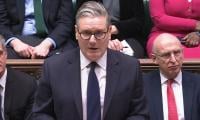Between militants and military
I do not recall any topic having been discussed so thoroughly in the media over the last few years a
By Ayaz Wazir
October 04, 2013
I do not recall any topic having been discussed so thoroughly in the media over the last few years as the recently adopted resolution by all the political parties in Islamabad on September 9 to engage with the Taliban for peaceful resolution of the conflict in the country.
The reaction of the public was initially positive but the gory incidents that took place in quick succession in and around Peshawar soon impacted that thought process and those opposed to the talks, but forced by circumstances to keep quiet, got this golden opportunity to oppose it openly. They opposed it so vehemently that it appeared as if this was only their problem and nobody else had any concern with it.
What happened in Peshawar was deplorable and the worst kind of barbarism, which nobody can condone, but that does not mean that the process of dialogue – which has a fair chance of success – should be abandoned altogether.
All sorts of questions – some relevant and some totally irrelevant – are being raised in the media these days leading more to confusion than to clarity on the issue. They refer to constitutional provisions or legal and administrative obstacles that stand in the way of the dialogue but without taking into account the constitutional position of Fata from where the problem started and where the negotiations will be held.
Article 1 of the constitution recognises Fata as being a part of the country but Article 247 (b) takes it out of the purview of parliament and makes the president its sole custodian. Constitutionally the president is empowered to administer it the way he likes, continue administering it as presently done through the draconian FCR (Frontier Crimes Regulations), make it a separate province or merge it with the Khyber Pakhtunkhwa province.
The president’s word is law for that area. Other laws of the land do not apply there nor does the Supreme Court have any jurisdiction there. All matters are settled through the provisions of the FCR which are completely different to the laws on the statute books applicable to the rest of the country.
Another important thing to bear in mind is the fact that Fata is administered and not governed. In Fata there is no such thing as government – of the type that we see in the rest of the country. The area is administered by the president through his agent – governor – who in turn appoints political agents (civil servants of grade 18-19) to run the day-to-day affairs.
Since the governor exercises all powers on behalf of the president his presence (at the All-Parties Conference) authenticates all proceedings that have anything to do with Fata.
In other words anybody sent to or any actions taken in Fata on his behalf have the same legal and constitutional sanctity as those taken by the government elsewhere in the country. Thus nothing seems to be wrong or unconstitutional with regard to the proceedings to be conducted with the Taliban in that region.
The next important subject that is debated in the media is the legal cover for the armed forces for tackling the problem of militancy there. That may be a requirement for settled districts in the country but certainly not for Fata where there is a special law in place called the ‘Actions in Aid of Civil Power Regulation’ which provides full legal cover to the armed forces and gives it sweeping power to deal with the subject.
Advocates of solely using force to resolve the problem are either not that well aware of the ground realities or have other objectives otherwise they would not have forgotten the fact that combat aircraft have already carried out around 6,000 aerial sorties for dropping more than 11,000 bombs from the sky on Fata although a force of over100,000 regular troops was present there to flush out militants from the area.
But have they? If force alone could have solved the problem it should have done so long ago. So let us not fool ourselves and also not confuse others by calling for use of force in Fata.
The people of Fata have rendered tremendous sacrifices for the sake of the country but there has been no recognition of that.
In the recent past they made the supreme sacrifice of leaving their homes and hearths to become IDPs (internally displaced persons) in their own country in order to facilitate the armed forces in their action against the militants. They did all they could do to provide space and a free hand to the armed forces to cleanse the area of militants.
It is another matter that militancy is still thriving and the blame for that is put squarely on the local people there, which is not a true reflection of the facts on the ground. The locals of Fata are neither favouring militants nor providing safe havens to them. They are sandwiched between the militants and the military and are no match for either of them.
Since the creation of the country they have been used as pawns, with no say whatsoever in the running of the affairs of their own area. Had they been consulted, the need for deployment of the armed forces would not have arisen nor would have militancy thrived so fast.
It is still not too late to correct the situation if Prime Minister Nawaz Sharif seriously wants to solve the problem. A lot of time has been wasted since adoption of the resolution to enter into dialogue with the Taliban unless the government has done it on the quiet.
Even then it should not forget to take the local people of Fata into confidence and act upon their advice for tackling the menace of militancy. It would be sagacious and prudent if elected members of parliament from Fata are involved in the process. They should initiate dialogue in their respective tribal agencies under the supervision of the governor of Khyber Pakhtunkhwa. They alone should be in the driving seat of negotiations and no one else.
Representatives of the ‘agencies’ may facilitate but should not take part in the substantive talks. This is the right way to resolve the problem – within no time – if the government is serious to get out of the mess it has landed itself in.
The writer is a former ambassador. Email: waziruk@hotmail.com
The reaction of the public was initially positive but the gory incidents that took place in quick succession in and around Peshawar soon impacted that thought process and those opposed to the talks, but forced by circumstances to keep quiet, got this golden opportunity to oppose it openly. They opposed it so vehemently that it appeared as if this was only their problem and nobody else had any concern with it.
What happened in Peshawar was deplorable and the worst kind of barbarism, which nobody can condone, but that does not mean that the process of dialogue – which has a fair chance of success – should be abandoned altogether.
All sorts of questions – some relevant and some totally irrelevant – are being raised in the media these days leading more to confusion than to clarity on the issue. They refer to constitutional provisions or legal and administrative obstacles that stand in the way of the dialogue but without taking into account the constitutional position of Fata from where the problem started and where the negotiations will be held.
Article 1 of the constitution recognises Fata as being a part of the country but Article 247 (b) takes it out of the purview of parliament and makes the president its sole custodian. Constitutionally the president is empowered to administer it the way he likes, continue administering it as presently done through the draconian FCR (Frontier Crimes Regulations), make it a separate province or merge it with the Khyber Pakhtunkhwa province.
The president’s word is law for that area. Other laws of the land do not apply there nor does the Supreme Court have any jurisdiction there. All matters are settled through the provisions of the FCR which are completely different to the laws on the statute books applicable to the rest of the country.
Another important thing to bear in mind is the fact that Fata is administered and not governed. In Fata there is no such thing as government – of the type that we see in the rest of the country. The area is administered by the president through his agent – governor – who in turn appoints political agents (civil servants of grade 18-19) to run the day-to-day affairs.
Since the governor exercises all powers on behalf of the president his presence (at the All-Parties Conference) authenticates all proceedings that have anything to do with Fata.
In other words anybody sent to or any actions taken in Fata on his behalf have the same legal and constitutional sanctity as those taken by the government elsewhere in the country. Thus nothing seems to be wrong or unconstitutional with regard to the proceedings to be conducted with the Taliban in that region.
The next important subject that is debated in the media is the legal cover for the armed forces for tackling the problem of militancy there. That may be a requirement for settled districts in the country but certainly not for Fata where there is a special law in place called the ‘Actions in Aid of Civil Power Regulation’ which provides full legal cover to the armed forces and gives it sweeping power to deal with the subject.
Advocates of solely using force to resolve the problem are either not that well aware of the ground realities or have other objectives otherwise they would not have forgotten the fact that combat aircraft have already carried out around 6,000 aerial sorties for dropping more than 11,000 bombs from the sky on Fata although a force of over100,000 regular troops was present there to flush out militants from the area.
But have they? If force alone could have solved the problem it should have done so long ago. So let us not fool ourselves and also not confuse others by calling for use of force in Fata.
The people of Fata have rendered tremendous sacrifices for the sake of the country but there has been no recognition of that.
In the recent past they made the supreme sacrifice of leaving their homes and hearths to become IDPs (internally displaced persons) in their own country in order to facilitate the armed forces in their action against the militants. They did all they could do to provide space and a free hand to the armed forces to cleanse the area of militants.
It is another matter that militancy is still thriving and the blame for that is put squarely on the local people there, which is not a true reflection of the facts on the ground. The locals of Fata are neither favouring militants nor providing safe havens to them. They are sandwiched between the militants and the military and are no match for either of them.
Since the creation of the country they have been used as pawns, with no say whatsoever in the running of the affairs of their own area. Had they been consulted, the need for deployment of the armed forces would not have arisen nor would have militancy thrived so fast.
It is still not too late to correct the situation if Prime Minister Nawaz Sharif seriously wants to solve the problem. A lot of time has been wasted since adoption of the resolution to enter into dialogue with the Taliban unless the government has done it on the quiet.
Even then it should not forget to take the local people of Fata into confidence and act upon their advice for tackling the menace of militancy. It would be sagacious and prudent if elected members of parliament from Fata are involved in the process. They should initiate dialogue in their respective tribal agencies under the supervision of the governor of Khyber Pakhtunkhwa. They alone should be in the driving seat of negotiations and no one else.
Representatives of the ‘agencies’ may facilitate but should not take part in the substantive talks. This is the right way to resolve the problem – within no time – if the government is serious to get out of the mess it has landed itself in.
The writer is a former ambassador. Email: waziruk@hotmail.com
-
 Sam Claflin Opens Up About Fame Triggered Struggle He Still Battles Every Day
Sam Claflin Opens Up About Fame Triggered Struggle He Still Battles Every Day -
 King Charles Breaks Silence After Andrew Finally Leaves Royal Lodge
King Charles Breaks Silence After Andrew Finally Leaves Royal Lodge -
 US-led Talks To Target China’s Critical Minerals Monopoly After Trump’s ‘Project Vault’
US-led Talks To Target China’s Critical Minerals Monopoly After Trump’s ‘Project Vault’ -
 Andrew Mountbatten-Windsor Lied About His Links With Jeffrey Epstein
Andrew Mountbatten-Windsor Lied About His Links With Jeffrey Epstein -
 From Handbags To Hashtags, PM Takaichi’s Charm Sparks Youth-led Craze Ahead Of Elections
From Handbags To Hashtags, PM Takaichi’s Charm Sparks Youth-led Craze Ahead Of Elections -
 US Bipartisan Senate Bill Targets Surge In Social Media Scam Ads
US Bipartisan Senate Bill Targets Surge In Social Media Scam Ads -
 Kate Middleton Receives Special Gift For Herself, Prince William In Wales
Kate Middleton Receives Special Gift For Herself, Prince William In Wales -
 'Disgraced' Andrew, Sarah Ferguson Done 'untold Damage' To Monarchy
'Disgraced' Andrew, Sarah Ferguson Done 'untold Damage' To Monarchy -
 Inside Winter Olympics Games 2026: Smart Replays, Drones, High-tech Torches And More
Inside Winter Olympics Games 2026: Smart Replays, Drones, High-tech Torches And More -
 Rare Deep-sea Discovery: ‘School Bus-size’ Phantom Jellyfish Spotted In Argentina
Rare Deep-sea Discovery: ‘School Bus-size’ Phantom Jellyfish Spotted In Argentina -
 Kate Middleton’s Son Prince George Sparks Sympathy For The Beckhams: ‘She Feels For Their Family Rift’
Kate Middleton’s Son Prince George Sparks Sympathy For The Beckhams: ‘She Feels For Their Family Rift’ -
 Switching From ChatGPT? Google May Let You Import Your Chats Into Gemini
Switching From ChatGPT? Google May Let You Import Your Chats Into Gemini -
 Jesy Nelson Voices Awareness About Raising Twins With SMA
Jesy Nelson Voices Awareness About Raising Twins With SMA -
 Prince William 'furious' At King Charles Over Andrew Scandal
Prince William 'furious' At King Charles Over Andrew Scandal -
 Lorde Makes Major Donation Amid Tour
Lorde Makes Major Donation Amid Tour -
 Pal Speaks Out About Andrew Mountbatten-Windsor's Move: 'Leaving Was So Humiliating'
Pal Speaks Out About Andrew Mountbatten-Windsor's Move: 'Leaving Was So Humiliating'



